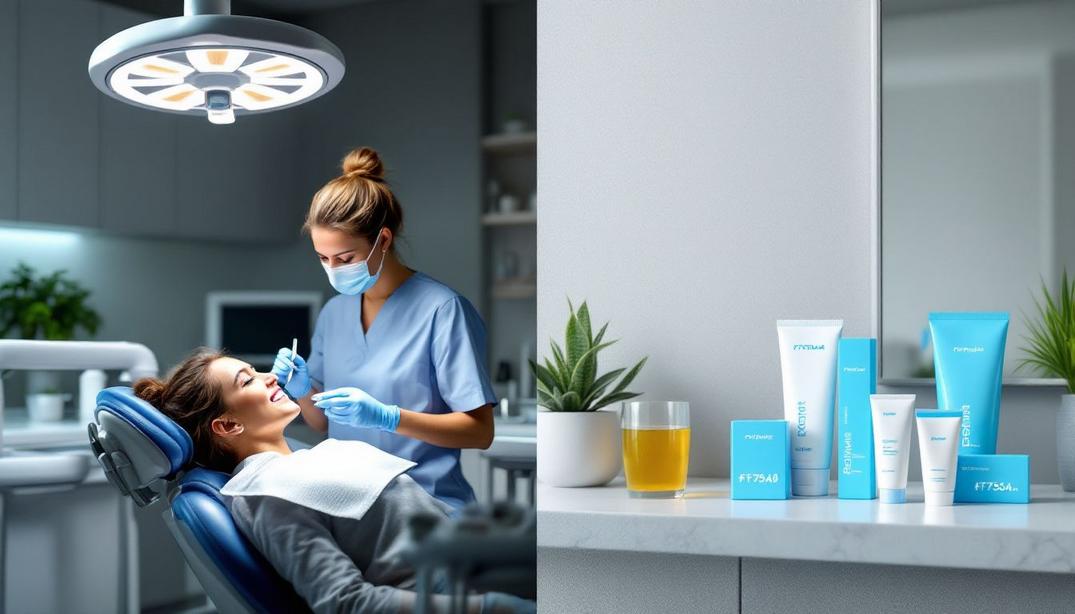Who doesn’t want a brighter, whiter smile? With so many options available, it can be tricky to choose between professional teeth whitening and over-the-counter (OTC) products. While both aim to lighten stains and enhance your smile, the results, safety, and costs can vary significantly. This blog unpacks the key differences, so you can decide which route best suits your needs.
TLDR – Quick Guide
- Professional Whitening: Offers dramatic results, overseen by a dentist, and uses stronger bleaching agents.
- Over-the-Counter Products: Affordable and convenient but less effective for tough stains.
- Safety: Dentists ensure a safe application, while OTC products come with a higher risk of misuse.
- Cost Comparison: OTC products are budget-friendly, but professional treatments provide long-term value.
- When to Choose What: Opt for professional whitening for fast, noticeable results; use OTC products for mild discoloration or maintenance.
Detailed Breakdown
1. Effectiveness: Professional Whitening Wins
- Professional Teeth Whitening: Performed in-office or with custom take-home trays, this option uses high-concentration bleaching agents (up to 40% hydrogen peroxide) for fast and dramatic results. Many patients see their teeth whiten by several shades in one session.
- Over-the-Counter Products: These include whitening strips, toothpaste, and gels with much lower peroxide concentrations (usually 3-10%). While they can lighten surface stains, they struggle with deep discoloration and take weeks to show noticeable results.
2. Safety and Precision
- Professional Whitening: Dentists protect your gums and soft tissues with barriers and carefully monitor the procedure to minimize sensitivity or damage.
- OTC Products: Without professional supervision, there’s a risk of overuse or uneven application, which can lead to gum irritation or enamel erosion.
3. Cost Comparison
- Professional Whitening: Prices range from $300 to $1,000 depending on the treatment and location. It’s a bigger upfront investment, but the results last longer and often require fewer touch-ups.
- OTC Products: Affordable options like whitening strips or toothpaste cost $20 to $100. They’re accessible for those on a budget, though you may need multiple purchases for comparable results.
4. Duration of Results
- Professional Whitening: Results can last 1-3 years with proper care, such as avoiding stain-causing foods and drinks and using touch-up kits.
- OTC Products: Whitening effects typically last a few months and require consistent reapplication to maintain.
5. Customization
- Professional Whitening: Treatments are tailored to your specific needs, addressing deep stains or uneven coloration with precision.
- OTC Products: These are one-size-fits-all solutions, meaning they may not work as effectively for unique dental concerns like crooked teeth or severe discoloration.
Key Takeaways
- Professional teeth whitening provides faster, safer, and more noticeable results, making it ideal for special occasions or tough stains.
- Over-the-counter products are budget-friendly but less effective for deep whitening and carry a higher risk of misuse.
- Consider your goals, timeline, and budget when choosing between professional and OTC options.
- For long-term results, combine professional treatments with maintenance using high-quality OTC products.
FAQs
1. Is professional teeth whitening worth the cost?
Yes! While it’s more expensive upfront, professional whitening delivers long-lasting, dramatic results in a single session, saving time and providing better value over time.
2. Can OTC whitening products damage my teeth?
Overuse or improper application of OTC products can harm enamel or irritate gums. Always follow instructions carefully, and consult a dentist if you experience sensitivity.
3. How long does professional teeth whitening take?
In-office treatments typically take about an hour. Take-home kits from your dentist may require a few weeks for full results but are customized for your needs.
4. Can I combine professional and OTC whitening?
Absolutely! Many people use professional whitening for dramatic results and maintain their brightness with OTC products like strips or whitening toothpaste.
5. Who should avoid teeth whitening?
Teeth whitening is not recommended for pregnant women, individuals with gum disease, or those with severe enamel erosion. Consult your dentist to determine if it’s safe for you.
Choosing between professional teeth whitening and over-the-counter products depends on your goals and budget. While OTC options work for mild discoloration, professional treatments deliver a dazzling, lasting smile that’s worth the investment!

